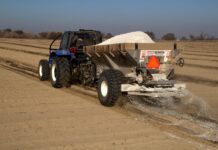All Californians can agree we want productive farms producing healthy foods while also ensuring the safety and protection of workers and communities. But how do we get there when the legislature continues to pass mandates that require regulatory agencies like the California Department of Pesticide Regulations (DPR) to undertake more rigorous scientific evaluations and monitoring programs to identify and address concerns about pesticides, but then introduces one-off bills to restrict specific pesticides based on allegations from any one group’s perception of that pesticide? While we respect legislators’ intention to address the concerns of stakeholders to ensure safe products, it seems we are caught in a non-productive cycle of the “tail wagging the dog” when it comes to achieving constructive pesticide policies.
Some legislators and stakeholders want answers fast. At the same time, they want more rigorous scientific analysis of pesticides. The thing is more rigorous scientific analysis takes time; you can’t really have it both ways. You can’t say you want the most rigorous analysis in the country and possibly in the world done, using the most recent scientific methods and incorporating new data as it’s developed, and then criticize DPR that they didn’t have the reevaluation done in one year. And it’s not fair to punish the agricultural community by removing tools based on allegations, not facts, because you’re unhappy that the reevaluation isn’t getting done fast enough to satisfy any one legislator.
To address the concerns and requests of some stakeholders and legislators to have DPR identify “priority products” for review and, in theory, to bring some consistency or understanding to agriculture of what products will be prioritized for reevaluation, DPR developed the Sustainable Pest Management (SPM) Roadmap.
Sustainable Pest Management Roadmap
DPR spent years holding advisory meetings, primarily comprised of environmental justice stakeholder groups and supported by the legislature to develop the new SPM Roadmap. The SPM system was developed to bring greater transparency to the registration and reevaluation process so the public could better understand the scientific process for product registration and reevaluations, ensure DPR maintains the highest scientific thresholds to assure the public that DPR didn’t cut any corners in their product evaluations and help streamline the registration process so new softer products can be provided to growers and consumers. Like any new system, it will be a lengthy process, but a process that community representatives who were part of the SPM Advisory Committee were fully involved with and endorsed.
Western Plant Health (WPH) is sympathetic to residents concerned about the health and safety of farm workers and rural communities. We support efforts to improve and protect human health and assure the environmentally safe use of pesticide products. However, we also support solutions that can address concerns based on facts. Other sectors of the community, like growers, should not be damaged as an outcome of non-fact-based assumptions. This is why we have supported DPR efforts to develop and establish a functional SPM system.
And yet, one year after DPR began implementing the SPM system to bring certainty and consistency to the regulatory process, we saw a record number of bills to ban or further restrict specific pesticides or classes of pesticides. These bills were introduced by legislators who voted in support of a more thorough and transparent pesticide regulatory system. We saw bills to eliminate rodenticides and specific herbicides (and herbicides in general) to increase restrictions on general-use pesticides around schools, even though those products already can’t be used within 24 hours of when children are present, and to require a pesticide notification system for every road and highway in California. That’s almost 200,000 miles of roads. And none of these bills were based on scientific studies peer-reviewed by any recognized scientific body.
Legislative Bans Now, Science Later
What is the justification for all this legislation? Some legislators felt DPR took too long to reevaluate products. So, rather than waiting for a determination based on sound science, those legislators decided to move forward with legislation banning or restricting products based on allegations and worry about the science later. At times, some legislators seem determined to ignore a scientific outcome to address pesticide safety concerns. The result is a nonsensical matrix of pesticide policy that agriculture and DPR are left to deal with.
The current situation leads to the tail wagging the dog scenario. If the legislature hops from one “hot topic” piece of legislation to the next and makes decisions based on assumptions, are they actually helping anyone? If growers are deprived of a tool because it feels good to eliminate a product, aren’t we simply contributing to pest and weed resistance because the growers’ toolbox just got reduced? The reality is if growers can’t protect their crops from the effects of climate change and the introduction of new pests because they have fewer tools due to legislative bans, they will be wiped out, and food prices will go up for consumers. How does that help anyone? How does a legislator think public policy based on mandates from the latest headline helps provide a protective environment for communities?
Again, WPH is sympathetic to the concerns of disadvantaged communities. But we want real solutions that are practical and based on sound science. If the legislature wants to remove pesticide products to better assure communities that they are safe, rather than introducing random bills, perhaps they would be better served to do what they are intended to do: Oversee the regulatory agencies that are charged with protecting human health and the environment. DPR is already rolling out the new SPM system, but it will take time to implement properly and meet its goals without causing unintended consequences. It’s important to remember all the advisory groups involved in developing the SPM system, including representatives from disadvantaged communities, signed off on the process. Before assuming these communities lack a voice with DPR, legislators should review the names of the organizations who participated on the Advisory Committee. If legislators want outdated products phased out, they should hold DPR accountable for accelerating the registration of new, safer products so growers can transition to better technologies.
We do not doubt legislators are sincerely interested in assuring pesticides are not impacting the health and safety of communities. If we want to move California toward a thoughtful process to address concerns, we encourage before a bill is introduced, legislators should become more aware of what DPR is doing to address their concerns and act as the oversight authority rather than trying to be scientists.
















